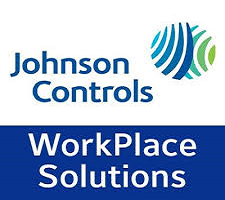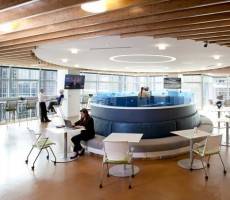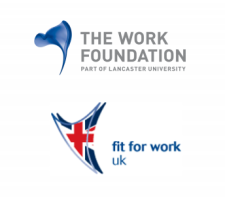September 30, 2014
Global Workplace Solutions to leave Johnson Controls’ portfolio
 Facilities services provider Global Workplace Solutions (GWS) is to leave the Johnson Controls portfolio following the parent company’s decision to concentrate on manufacturing, engineering and product-based, rather than services-based businesses. GWS, which provides facilities, corporate real estate and energy management, has been part of Johnson Controls’ portfolio for more than 20 years, and currently manages more than 1.8 billion square feet of corporate real estate. “We have a strong reputation in the market, an incredibly talented team of employees, and a portfolio of long-standing high-quality clients,” said John Murphy, vice president and president, GWS. “Our business has only just begun to realize its full potential. With a new owner we will have access to the capital and resources required to continue to strengthen our business and be a formidable force in the market.” (more…)
Facilities services provider Global Workplace Solutions (GWS) is to leave the Johnson Controls portfolio following the parent company’s decision to concentrate on manufacturing, engineering and product-based, rather than services-based businesses. GWS, which provides facilities, corporate real estate and energy management, has been part of Johnson Controls’ portfolio for more than 20 years, and currently manages more than 1.8 billion square feet of corporate real estate. “We have a strong reputation in the market, an incredibly talented team of employees, and a portfolio of long-standing high-quality clients,” said John Murphy, vice president and president, GWS. “Our business has only just begun to realize its full potential. With a new owner we will have access to the capital and resources required to continue to strengthen our business and be a formidable force in the market.” (more…)











 Amongst all the talk about Generation Y and its impact on the world of work, it can be easy to miss the fact that the modern workplace is not defined by one particular generation, but a number of them. The multi-generational workplace has significant implications for the way we design and manage offices. While we must avoid the more obvious stereotypes about the needs of different age groups, we must still offer spaces that can meet a wide range of cultural, physical and technological needs if we are to create productive workplaces.The latest organisation to bang the drum for the multi-generational workplace is the Chartered Institute of Personnel and Development. It has published new research together with the Scottish Centre for Healthy Working Lives into the experiences and attitudes of SMEs towards age diversity at work.
Amongst all the talk about Generation Y and its impact on the world of work, it can be easy to miss the fact that the modern workplace is not defined by one particular generation, but a number of them. The multi-generational workplace has significant implications for the way we design and manage offices. While we must avoid the more obvious stereotypes about the needs of different age groups, we must still offer spaces that can meet a wide range of cultural, physical and technological needs if we are to create productive workplaces.The latest organisation to bang the drum for the multi-generational workplace is the Chartered Institute of Personnel and Development. It has published new research together with the Scottish Centre for Healthy Working Lives into the experiences and attitudes of SMEs towards age diversity at work.
 The world of work and the workplace is always changing. We know it. You know it. In fact, there are a whole host of people that know it, but depending on what side of the professional fence you sit on, you might approach it in different ways, looking through a different lens or with a specific focus. Or are you already bridging the professional gap? Workplace change and the numerous ramifications of it are well documented. In a world that is changing, at frightening pace, it is strange to think that many of the ways in which we work are so entrenched in 20th century thinking. We need to break away from this and outline what the future is going to look like and how we should adapt. Or do we already have the answers? This ground is well trodden. However, it could be time to reassess our thinking and the way we approach this challenge, ensuring it becomes the norm for organisations around the world.
The world of work and the workplace is always changing. We know it. You know it. In fact, there are a whole host of people that know it, but depending on what side of the professional fence you sit on, you might approach it in different ways, looking through a different lens or with a specific focus. Or are you already bridging the professional gap? Workplace change and the numerous ramifications of it are well documented. In a world that is changing, at frightening pace, it is strange to think that many of the ways in which we work are so entrenched in 20th century thinking. We need to break away from this and outline what the future is going to look like and how we should adapt. Or do we already have the answers? This ground is well trodden. However, it could be time to reassess our thinking and the way we approach this challenge, ensuring it becomes the norm for organisations around the world.







September 16, 2014
Indoor air quality and the quest for a breath of fresh air in the workplace
by Justin Miller • Comment, Facilities management, Knowledge, Legal news, Workplace design
Edward Hopper, Office in a Small City, Metropolitan Museum of Art, NY
The modern workplace has to work harder than ever before. It must reflect corporate values, express something of the organisation’s brand, allow people to work to the best of their ability as well as look after their wellbeing, keep touch with the pace of changing technology and meet the demands of an ever changing legislative environment and keep costs down. All of these issues conflate around the challenge of providing a sustainable, comfortable and productive working environment in buildings that are filled with an increasing number of people and computers. It is estimated by the Building Research Establishment that even in a typical office each person and their technology will generate some 1500 W of energy per hour, the equivalent of the sort of fan heater that the EU is now keen to ban outright.
(more…)